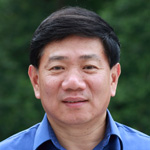非常抱歉,
你要访问的页面不存在,
非常抱歉,
你要访问的页面不存在,
非常抱歉,
你要访问的页面不存在,
验证码:

职称:Professor of Microbiology and Immunology Molecular mechanisms of cytokine gene expression and their immunological activities in auto- and tumor-immunity
所属学校:Cornell University
所属院系:Weill Cornell Medical College (New York City)
所属专业:Microbiology, General
联系方式: (212) 746-4404
“Large-scale cell death occurs in cancer treatment by conventional irradiation and chemotherapy. Clearance of the dead cells in the body is mainly carried out by professional “scavengers” called phagocytes. This is an evolutionarily well conserved way to “cleansing” the bodily system of cellular debris and wastes, and to prevent inflammatory damage to ourselves. The great dilemma is that, when dead cancer cells are removed by phagocytes, the same intuitively “protective” action is provoked, as a number of suppressive factors that cause “immune tolerance” are produced by phagocytes, making the immune system oblivious of the residual cancer cells lingering in the body. This phagocyte-induced immune suppression is one of the main reasons for the emergence of immune escape variants and cancer recurrence even in the presence of common anti-cancer drugs. This phenomenon represents a “natural barrier” and a major hurdle in conventional cancer therapies that have not been appreciated or even been ignored. How to break the immune tolerance caused by phagocytes that have ingested dead cancer cells without causing severe autoimmune “collateral damage” is the overarching challenge that we are trying to address at both scientific and practical levels. We will seek to further uncover the fundamental mechanisms by which the immunosuppressive factors are produced by phagocytes after clearing dead cancer cells. Armed with the knowledge, we will then test the idea of blocking the production of these immune-inhibiting molecules in animal and “humanized” mouse models of breast cancer to determine if the suppressed immune system can be reactivated to kill residual and even dormant cancer cells, and establish persistent immune memory that can recognize and eliminate recurring cancer cells. The long-term goal of the project is to identify appropriate ways to overcome the natural obstacle in standard cancer therapies.”